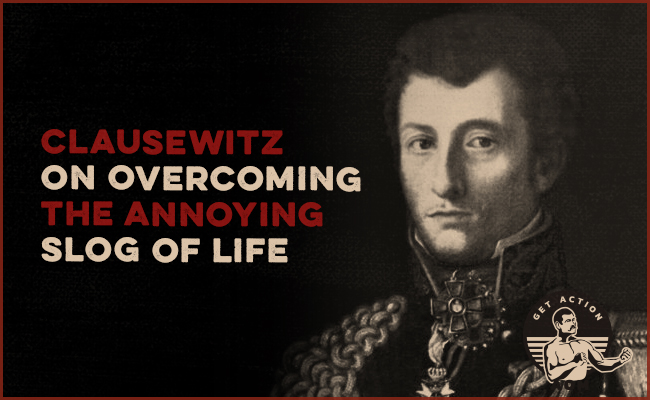
Man, life can be a slog sometimes.
Each day, annoying little piddly things arise that aren’t hard to manage one by one, but, when taken together, really muck up your mojo. Your car breaks down, your kid gets sick, an employee loses a file, you’ve discovered a leak in your roof . . . and it’s just 9 a.m.
How do you handle these small-but-rhythm-destroying vexations? How do you deal with slog-inducing annoyances without letting them throw a wrench in the gears of your goals?
Thankfully, famed war strategist Carl von Clausewitz provided some insights in his landmark work, On War, that are just as applicable to the home and office, as the battlefield.
Friction, Friction Everywhere
Everything in war is very simple, but the simplest thing is difficult. The difficulties accumulate and end by producing a kind of friction that is inconceivable unless one has experienced war.
Clausewitz’s most enduring and insightful idea in OnWar is friction.
Friction explains why a general can have a plan for battle that looks perfect on paper, but falls apart in real life. Friction torpedos morale and slows down action.
Friction isn’t just one thing. It’s the accumulation of a bunch of little things. Says Clausewitz:
Countless minor incidents—the kind you can never really foresee—combine to lower the general level of performance, so that one always falls far short of the intended goal.
To help his readers understand friction in warfare, he gives an analogy from everyday life in the 19th century that we can still imagine parallels to today:
Imagine a traveler who late in the day decides to cover two more stages before nightfall. Only four or five hours more, on a paved highway with relays of horses: it should be an easy trip. But at the next station he finds no fresh horses, or only poor ones; the country grows hilly, the road bad, night falls, and finally after many difficulties he is only too glad to reach a resting place with any kind of primitive accommodation.
As the complexity in any endeavor increases, friction increases as well, because there are simply more opportunities for things to get mucked up. The bigger and more complicated the endeavor, the larger the amount of friction.
A factor that increases complexity, and thus friction, more than any other, is the inclusion of other human beings. Humans are the ultimate friction creators. Clausewitz notes that a battalion, by its very nature, will experience plenty of friction, because it’s made up of many different individuals who can interact with each other in a multiplicity of problem-producing ways. One soldier gets scared and runs, resulting in other soldiers catching the fear contagion and running. Before you know it, you’ve got an unplanned, chaotic retreat. Damn you, friction!
If life seems like an annoying slog sometimes, it’s because of friction.
Any endeavor, whether it’s planning a party or starting a business or just living life, will encounter friction along the way. Little unforeseen pain points come together to make what seems easy to accomplish in theory, pretty hard to accomplish in practice. And because most of what we do in life involves our fellow human beings — the Vesuvian volcanoes of vexation — we experience a lot of friction in our lives.
If you
No comments:
Post a Comment